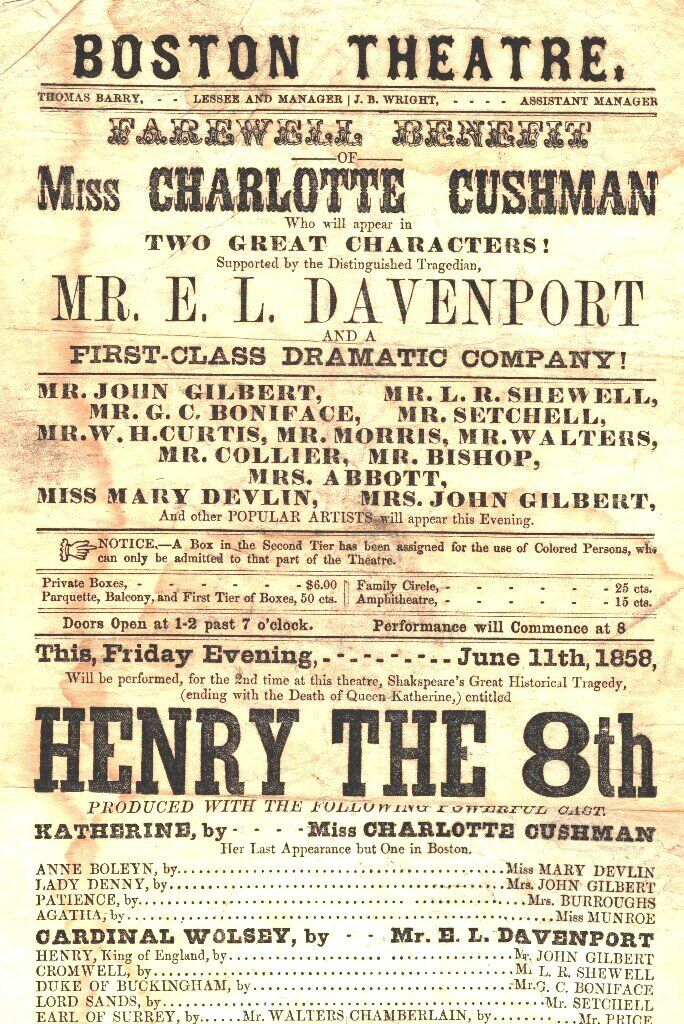June 1858 (165 years ago)

Prematurely announcing her retirement from the stage, Charlotte Cushman performed as Katherine in Henry XIII and Mrs. Simpson in John Poole’s comedy Simpson & Co. at the Boston Theatre. This constituted one leg of her acclaimed American tour, after she’d spent many years in Europe as a premier Shakespearean interpreter. Advertisements stated this show would be the “Last appearance in Boston, of the Great Tragic Actress.” Her U.S. tour, however, reinvigorated both her career and personal life. During a February 1858 performance of Romeo and Juliet in St. Louis, in which Cushman performed the breeches role of Romeo, she met a young woman named Emma Crow. What began as a flirtation led to a long romance, despite Charlotte’s long relationship with sculptor Emma Stebbins. Contrary to the 1858 announcement, Cushman would again perform in Boston in 1875 before retiring from the stage for good.
June 1923 (100 years ago)

High in the woods of Bremerton, Wash., the Mountaineers Players staged their first major production, Robin of Sherwood. The audience were other Mountaineers, members of an alpine hiking organization, who climbed some two miles into the Rhododendron Preserve to watch this premiere production. Much credit was given to Howard Kirk; he not only played the title role, but served as stage manager, prop and costume designer, and playwright. The success of this production invigorated the small company and by 1928 the Kitsap Forest Theater, a small outdoor theatre, was built, tucked into the green Preserve. The Mountaineer Players have since performed one to two productions a year and maintain one of the oldest outdoor theatres in the United States.
June 1973 (50 years ago)

Queen Elizabeth II and Prince Philip opened Niagara-on-the-Lake’s 856-seat Shaw Festival Theatre in Ontario with a production of George Bernard Shaw’s You Can Never Tell. The organization had begun 11 years earlier with playwright Brian Doherty and arts philanthropist Calvin Rand’s mission to produce and promote the work of Shaw at the Court House Theatre. In 1967, the organization was reconstructed as the Shaw Festival Theatre under director Paxton Whitehead, and this 1973 opening marked the Festival’s inaugural season. In subsequent years, the Shaw Festival opened two more spaces—the Royal George Theatre and the Jackie Maxwell Studio Theatre—and expanded its repertoire beyond the works of Shaw. To date, the theatre ranks among some of the largest repertory theatre companies in North America.
June 1983 (40 years ago)

At the 37th Tony Awards, John Glines accepted the Tony award for producing the Best Play Torch Song Trilogy, and made history by thanking his business and intimate partner Lawrence Lane from the Gershwin stage—the first time a gay relationship was openly acknowledged during the ceremony. As a theatre producer and playwright, John had aimed to represent gay lives onstage, and the AIDS crisis only enhanced the urgency of this mission. In a 1976 interview, he stated that his producing vision was, “To explore the gay experience, to create a space where that could be examined: what it meant to be gay.” After Harvey Fierstein’s trio of Torch Song plays had ended their runs at New York’s La MaMa in 1979, John Glines and partner Lane produced its transfer to the Richard Allen Center in 1981 as a four-hour epic. Late but laudatory reviews from The New York Times fueled a rewriting of the play and a Broadway transfer, earning the work its Best Play Tony. Glines would produce another Tony-nominated gay play, William M. Hoffman’s 1985 play As Is, which was also the first play about AIDS to make it to Broadway.
June 2013 (10 years ago)

The new musical Stu for Silverton opened at the Intiman Theatre Festival in Seattle. Written by Peter Duchan (Dogfight), with music by Breedlove and direction by Andrew Russell, this comedic true-to-life story told of Steward “Stu” Rasmussen, the first transgender mayor in the United States. When reelected as mayor of Silverton, Ore., in 2008, Stu came out as transgender, which led to much media attention, as well as the ire of the notoriously rancorous Westboro Baptist Church. The musical traced the personal life of Stu, as well as the activism of the townspeople of Silverton against the intolerance of Westboro protestors, in a production that the Seattle Times called “a fond tribute to small-town Americana at its best, and to the kind of tolerance ordinary citizens can rise to.”


